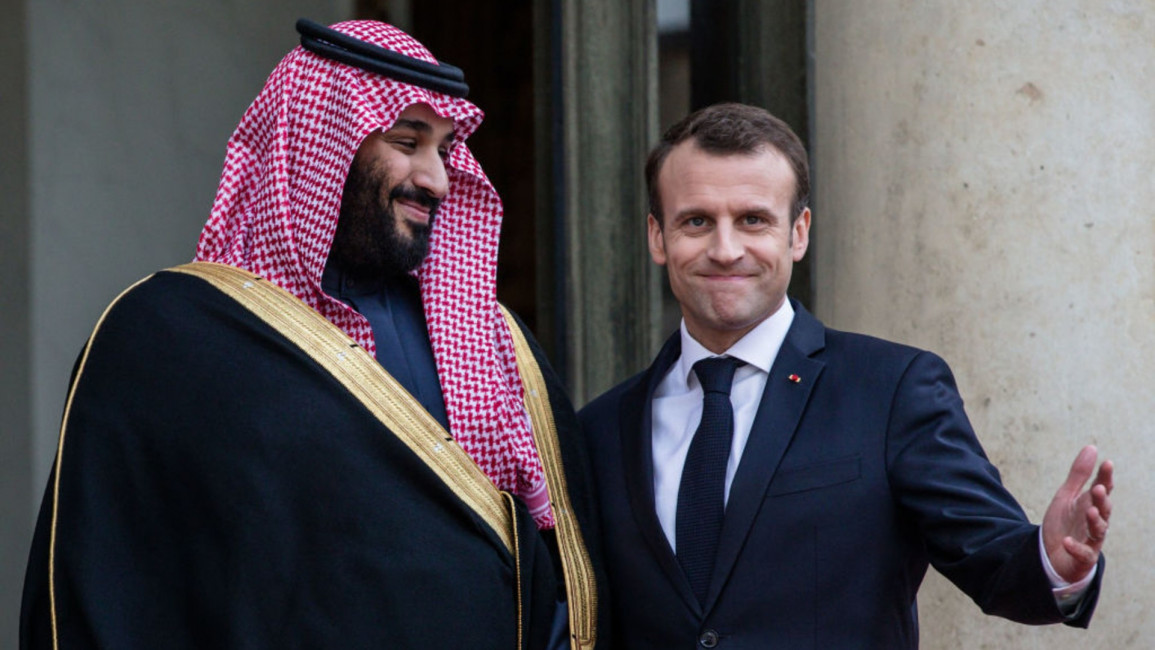
Made in Europe: Saudi soldiers, weapons deals and unethical jobs
These soldiers were brought over to Commercy in eastern France and taught to use arms that were reportedly being used against the Yemeni people, in Saudi Arabia's continued war in that country. The devastating consequences of the conflict - famine, mass epidemics, and economic collapse alongside growing military death tolls - are well documented.
This does not appear to be a cause for concern to French authorities.
Journalist Audrey Lebel, writes in Amnesty's publication, La Chronique, of the involvement of local French officials, alongside the private Belgian company John Cockerill, in developing this highly profitable project. The involvement of Gérard Longuet, former French Defence minister and currently a Senator for the Meuse region where this programme runs, is an especially disturbing revelation.
Longuet has also served on the John Cockerill board of directors since 2013. He was key in introducing the company's CEO Bernard Serin to General Ract-Madoux, the French army chief of staff, as well as facilitating the relationship between the two entities.
Serin and Longuet even worked together to award the company state support, and to bring the training programme to the Meuse region. Given the Saudi-led war in Yemen, this is a deal that has facilitated and contributed to the unthinkable level of destruction in the country, and the countless civilian deaths during the years that followed.
Indeed, the ongoing assault on Yemen, which has devastated the country since 2015 has led to the displacement of over 3.3 million people. Unimaginable suffering, including the spread of cholera and recurring famine have all been brought on by the Saudi-led coalition's blockade. Described as the "worst humanitarian catastrophe in the world" by the United Nations, this is hardly a political crisis that can be overlooked, ignored or even downplayed.
 |
It was in 2018 - three years after the start of the war - that Saudi military personnel were welcomed at the training ground in France |  |
Yet, it was in 2018 - three years after the start of the war, when the extent of the catastrophe was well known - that Saudi military personnel were welcomed at the training ground. Throughout the long years of countless fatalities from military offensives, including airstrikes and raids, none of the complicit parties have even reviewed the continuation of the programme, let alone ended it in the name of basic humanity.
When questioned, Longuet even stated that, "I don't have the power to stop wars. When France sends Rafales [fighter aircraft] to India, it is not for the 14th July military parade, it is to transform people into charcoal".
Revolting as it is, this statement appears to represent a much more general and institutional approach to the issue. In 2019, the investigation that led to the publication of the Yemen Papers, by Disclose magazine, uncovered that French President Emmanuel Macron and his army minister, Florence Parly, had both received secret files which proved the use of French arms in Yemen.
Twitter Post
|
Nor was this the only element of Cockerill's implication in the war. Amnesty international also found that the Belgian company declared that it had achieved the 'deal of the century' when it signed an almost $5 billion contract in 2014, which committed it to deliver just under 1,000 "Canadian-made armoured vehicles" to the Saudi regime. And what a deal it was.
Furthermore, the entire affair was justified, Amnesty found, as an employment opportunity for the local area in France. Brown and black people abroad can be dehumanised and killed mercilessly by the tools of war produced by western companies and governments, and the imbalance is justified by the job offers created in Europe.
Read more: UN warns Yemen on the brink of famine again
Similar arguments are made in the UK also to justify the continued development of weapons, their sale, and - critically - use across the world. Yet workers themselves have long put alternative proposals forward.
Ray, a Unite rep in aerospace, for example, tells me that "we need to transition from arms industry work to socially and environmentally useful and sustainable work." He argues that this is especially doable "when yards or factories are threatened with closure. That is a winnable argument I think. All it takes is one well organised site or yard and the community to fight, occupy etc with demands for a just transition to shift this."
Unite the union committed at its 2018 policy conference to support "campaigning at every level, including the establishment of a cross-sectoral defence and diversification combine, to secure a serious government approach to defence and diversification." It also noted that "it is only [its] members who have devoted significant time and energy to develop and promote these initiatives", while both Labour and Tory governments have stood in their way.
The truth of course is that capital cares little about "job creation" - a sad euphemism in this case for the silent compulsion of the market that forces workers, especially in times of crisis, to choose between abject poverty or participating in the spread of murder and destruction - and cares only for their profits.
Indeed, the irony of all of this, is that there isn't even much proof that the working classes and the unemployed in France benefit from this programme, which the Amnesty investigation even highlighted to be the case. It found that in 2015, the projection was that it would generate "25 direct jobs… and 75 indirect jobs". Five years later, only 20 of those appear to have materialised.
 |
Brown and black people abroad can be killed mercilessly by the tools of war produced by western companies, and the imbalance is justified by the jobs created in Europe |  |
Workers in the West are ignored, left to make individual choices between their morals and their immediate economic needs, while thousands around the world pay with their lives and their livelihoods for the continued drive for profit of armament companies.
The French government - but also its UK counterpart, which has also recently announced its continued commitment to selling weapons to the Saudi regime despite recognising their "possible" use in war crimes - care little for their working population, as their repeated austerity measures demonstrate all too well.
They are driven only by their desire to maintain - or increase - their influence and control over the resources and workforces of the Global South, to continue lining the pockets of the richest at home.
Democracy, freedom of the press, or women's liberation vanish like hot air, the second dollars, euros, and - in this case - riyals are on the table.
The solution then, can only come from serious, committed internationalist responses, led by social movements and workers in the West and mass resistance in the Global South. Our struggle to invest in renewable energies and create jobs at home does not run against the interests and lives of those in Yemen, Palestine, or Iraq.
On the contrary, the struggle to end weapon exports, is the struggle to end the armament industry, and to turn it into productive, socially useful, and ecologically necessary ones. It is a struggle, as always, against our government and our employers. Our enemy, after all, is at home.
Malia Bouattia is an activist, a former president of the National Union of Students, and co-founder of the Students not Suspects/Educators not Informants Network.
Follow her on Twitter: @MaliaBouattia
Opinions expressed in this article remain those of the author and do not necessarily represent those of The New Arab, its editorial board or staff.




